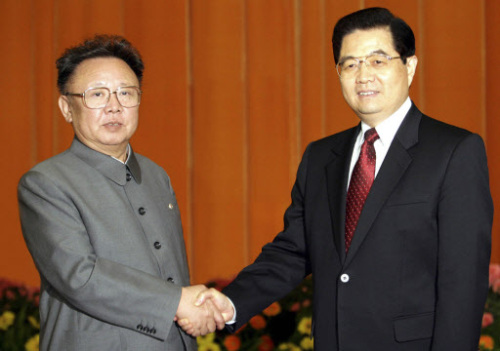
North Korean leader Kim Jong-il met with Chinese President Hu Jintao yesterday to discuss efforts to rejoin the six-nation nuclear talks and Beijing’s economic aid to the impoverished state, sources said.
The two were believed to have held a summit meeting before the welcome dinner which usually starts at around 7 p.m., diplomatic sources in Beijing said.
After the summit and dinner with Hu, Kim is expected to meet with Chinese Premier Wen Jiabao, who visited Pyongyang in October, and Vice President Xi Jinping today.
“Pyongyang must have extended its willingness to return to the six-nation talks, otherwise Kim Jong-il’s visit wouldn’t have happened,” said Yang Moo-jin, professor at the University of North Korean Studies here.
Choi Choon-heum, senior analyst of North Korea-China relations at the Korea Institute for National Unification, said Hu was likely to have reaffirmed Beijing’s commitment to the six-party talks and stressed the importance of inter-Korean relations amid increasing suspicion that North Korea may have been involved in the recent sinking of a South Korean naval ship.
Kim crossed into China in a special train on Monday, his fifth visit to North Korea’s main political benefactor since 2000. On Tuesday, he toured industrial facilities near the eastern port city of Dalian. Kim then traveled to Tianjin, 150 kilometers southeast of Beijing. He arrived in Beijing yesterday afternoon.
Kim’s trip to Beijing came just days after Hu expressed condolences during a brief summit meeting with President Lee Myung-bak last Friday on the death of the 46 South Korean crewmen of the Cheonan that mysteriously sank in March near the inter-Korean sea border.
It also came as North Korea seeks a return to the six-party talks on its nuclear arms programs on certain conditions.
South Korea has expressed regret to China over the timing of Kim’s visit, maintaining that it will not agree to the resumption of the six-party talks until the culprit in the sinking is found. North Korea denies its involvement.
Kim rarely travels abroad. His last visit to China came in January 2006. Beijing has so far refused to confirm to reporters that Kim was in the country as it usually makes an official announcement on his visits after Kim returns safely back home.
During his stay in Beijing, Kim Jong-il was expected to follow up on Beijing’s promise of economic aid.
Earlier this year, North Korea publicized its plans to attract investment, mainly Chinese, in the Raseon special economic zone formerly known as Rajin-Seonbong, and to build infrastructure across the country using foreign investment.
“North Korea’s signal that it would return to the six-party talks would allow China to expand economic aid and investment in the North,” Hyundai Economic Research Institute said in a recent report.
“North Korean towns bordering China could be incorporated into the Chinese economic bloc or China could monopolize North Korean natural resources. Chinese capital is expected to make inroads into the North Korean consumer market and dominate North Korean tour businesses.”
China’s economic aid could be limited, however, as Seoul and Washington strengthen cooperation in dealing with the Cheonan disaster, which may or may not have been caused by the North.
When Chinese Premier Wen Jiabao visited Pyongyang in October last year, Wen and Kim Jong-il appeared to have discussed developing the Rajin port, building a second bridge over the Yalu River and a highway between Pyongyang and Sinuiju, according to Hong Ik-pyo, senior researcher at the state-run Korea Institute for International Economic Policy.
“Kim and Hu are expected to discuss actual implementation of some of the investment agreements made then,” Hong said.
North Korea has been in growing need of outside assistance to overcome its economic troubles, which deepened after a botched currency reform last year that led to social unrest.
Kim’s stop at Tianjin yesterday indicated his interest in developing North Korean port cities as a way to boost trade.
Kim last visited Tianjin in 2004. In February this year, a senior North Korean party official visited the city in what appeared to be an inspection ahead of Kim‘s tour of the area.
Early yesterday morning, parts of a highway leading to Tianjin were shut down temporarily for apparent security reasons.
As for China’s food aid to North Korea, Beijing was unlikely to offer much this time, he said.
“China has customarily provided food aid to the North after a summit meeting, but it is unlikely to offer more than 10,000 tons of food this time, be it rice or corn. It could instead expand the grain export quota to the North and ease regulations on the trade of food near the border,” Hong said.
Another expert said China was expected to provide around half a million tons of food as North Korea’s estimated food shortage this year is thought to be 1.5 million tons.
By Kim So-hyun (sophie@heraldcorp.com)



![[Exclusive] Korean military set to ban iPhones over 'security' concerns](http://res.heraldm.com/phpwas/restmb_idxmake.php?idx=644&simg=/content/image/2024/04/23/20240423050599_0.jpg&u=20240423183955)

![[Graphic News] 77% of young Koreans still financially dependent](http://res.heraldm.com/phpwas/restmb_idxmake.php?idx=644&simg=/content/image/2024/04/22/20240422050762_0.gif&u=)



![[Pressure points] Leggings in public: Fashion statement or social faux pas?](http://res.heraldm.com/phpwas/restmb_idxmake.php?idx=644&simg=/content/image/2024/04/23/20240423050669_0.jpg&u=)









